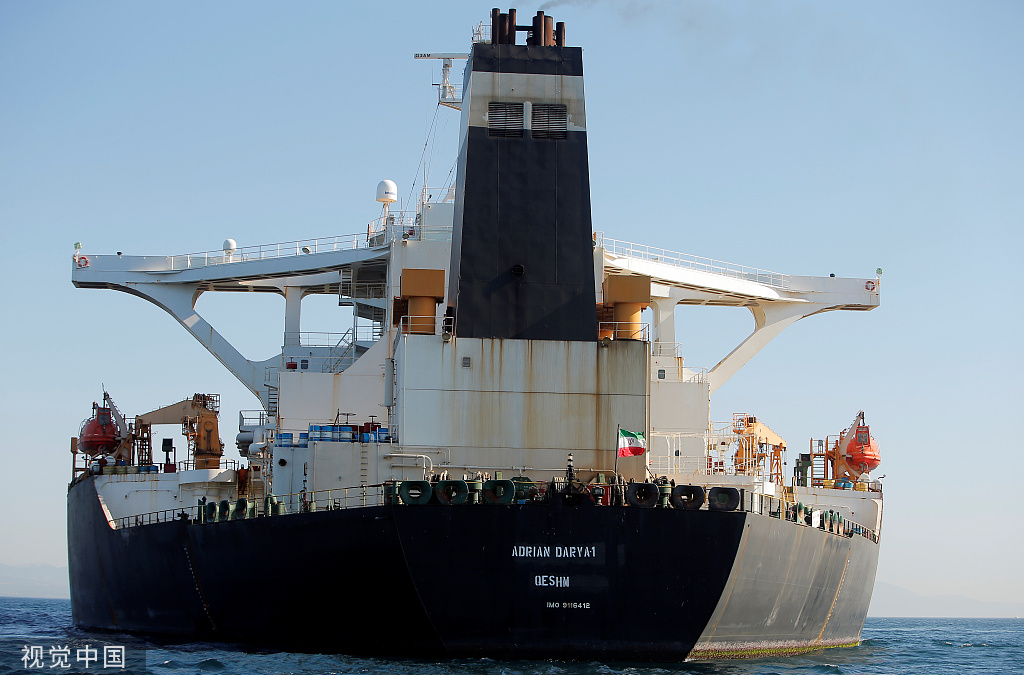What Adrian Darya 1 tells us about US foreign policy
- By George N. Tzogopoulos
 0 Comment(s)
0 Comment(s) Print
Print E-mail China.org.cn, September 12, 2019
E-mail China.org.cn, September 12, 2019

The destination of the Iranian tanker Adrian Darya 1 was a theme of high international importance for over two months. Relations between the U.S. and Iran are strained as a result of President Trump's decision to withdraw from JCPOA, and he is now seeking further sanctions against Tehran.
The case of the Iranian vessel loaded with 2.1 million barrels of crude oil constitutes a tangible example of how the American policy is being executed. Washington believes Tehran is destabilizing the Middle East region and also financing terrorist organizations. It therefore seeks to prevent actions that arguably support the Iranian cause. By closely monitoring, and also blacklisting, Adrian Darya 1, the U.S. hoped the vessel would not able to discharge its oil in Syria.
Washington expects other countries to comply with the sanctions, even if they do not agree with the approach. The EU, in particular, has been under pressure by the American administration to stop doing business with Iran.
In early July, the Adrian Darya 1 – then known a Grace 1 and operating under the Panama flag – was seized by British Royal Marines in Gibraltar on suspicion of carrying oil to Syria. Tehran accused London of piracy. Soon after, Iranian forces captured the British flagged tanker, Stena Impero, in the Persian Gulf. The official justification was that it had violated maritime law.
The "tanker crisis" took a different course in mid-August. Gibraltar decided then to release Adrian Darya 1. In substance, the enforcement of sanctions can be legally interpreted in a different way in the European and the American territories.
Whereas, in the Western discourse, the release of the Iranian vessel was attributed to the alleged commitment of Tehran that it would not head for Syria, the Iranians refuted the existence of such a condition.
Released from detention, Adrian Darya 1 looked for its new destination. The location of a ship is publicly known due to signals that it gives. The U.S. was highly concerned about the ship's next stop and warned other countries to refrain from opening their ports to it. Greece is a characteristic example. One of its cities, Kalamata, was among the potential destinations but this ultimately did not happen.
Looking at the available signals, the Iranian ship sailed east of Gibraltar, off Sicily, south of Crete, between Cyprus and the Turkish coasts, and possibly to Lebanon. It then turned off its transponder and – according to American sources – was heading towards Syria where it unloaded its cargo. The Iranian foreign ministry did not elaborate on the country involved, but confirmed the ship docked at a Mediterranean port.
As far as the tanker's oil is concerned, the Iranian authorities announced in August that it had already been sold, without disclosing the name of the buyer. Tehran has also started to free some members of the Stena Impero crew.
Generally speaking, the U.S. has been attempting to deal with the "tanker crisis" without taking the risk of seizing the Adrian Darya 1. It seriously understands the potential consequences including the risk of a real war – beyond the public threats and tweets of President Trump.
It is perhaps no coincidence that some Western media revealed Washington is bargaining with the Indian captain of the Iranian vessel to offer him better treatment in exchange for information. The release of Adrian Darya 1 from Gibraltar was undoubtedly a blow to American legal efforts.
The U.S. did not succeed in blocking the Iranian tanker and its policy has produced some contradictory results. Transatlantic relations do continuously deteriorate, because Europe – including the U.K. – favors the finding of compromises with Iran and prefers stability in the Persian Gulf.
Additionally, the zero-sum game might benefit third parties and challenge Washington priorities. Russia, for example, could take a higher percentage in the energy market and increase its sales under current circumstances.
Several research organizations and think tanks in the U.S. openly criticize President Trump for this. Russia and Iran are gradually strengthening their ties. At the beginning of September, Foreign Minister Sergey Lavrov and his counterpart Mohammad Javad Zarif held talks in Moscow.
Additionally, the status of the U.K. is difficult and delicate in a period during which the country is overwhelmed with Brexit. It supports JCPOA, but it has been drawn into a diplomatic standoff with Iran and practically needs to find its own solutions.
Prime Minister Boris Johnson seeks to please President Trump, but has not received the support he could have wished for. This is what the case of Stena Impero demonstrates.
The American President, who recently spoke of the possibility of direct negotiations with his Iranian counterpart Hassan Rouhani, adds further complexity to the situation. While continuity is missing, it is unclear what his final objectives are.
George N. Tzogopoulos is a columnist with China.org.cn. For more information please visit:
http://m.formacion-profesional-a-distancia.com/opinion/GeorgeNTzogopoulos.htm
Opinion articles reflect the views of their authors, not necessarily those of China.org.cn.
If you would like to contribute, please contact us at opinion@china.org.cn.





